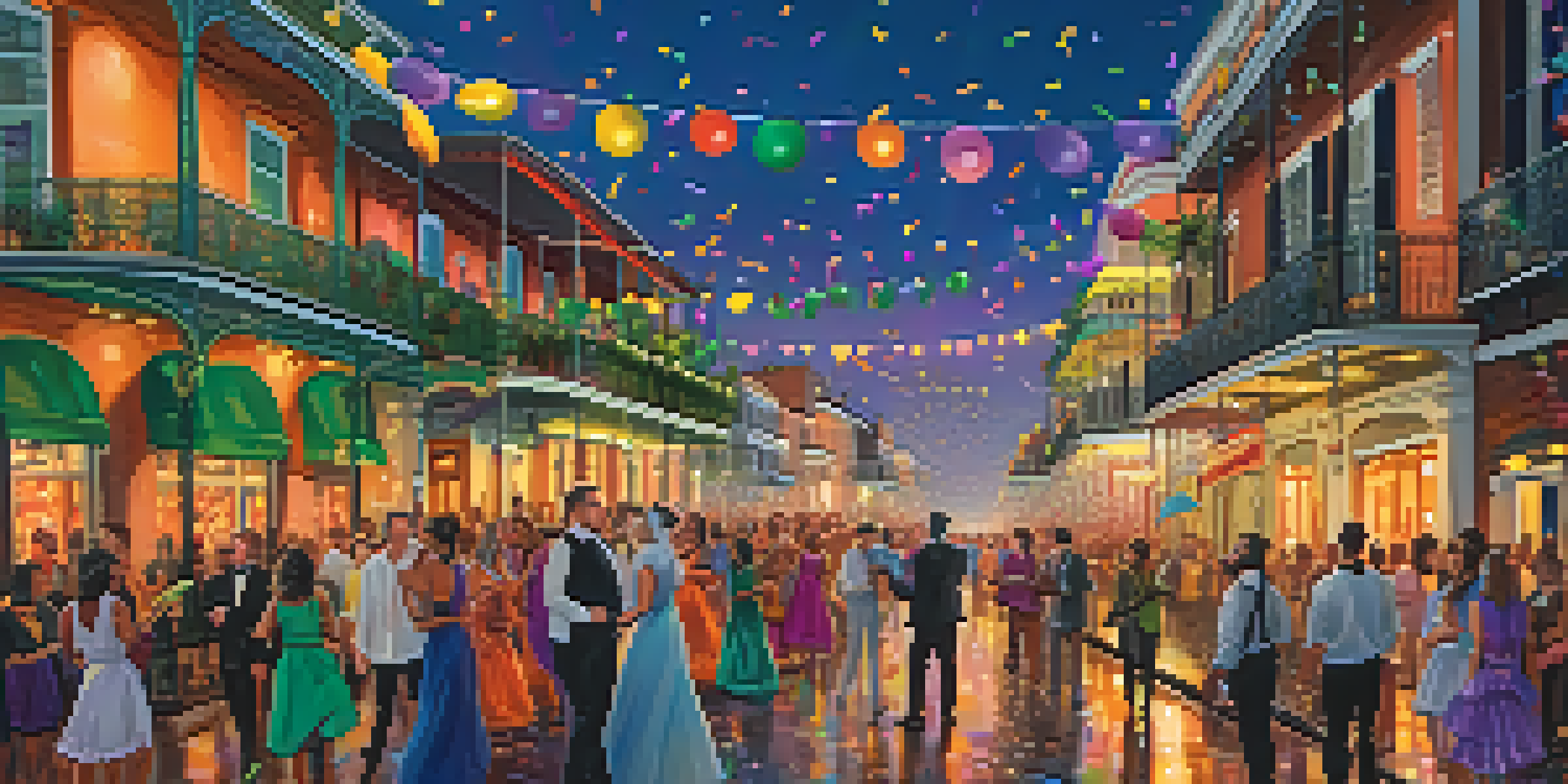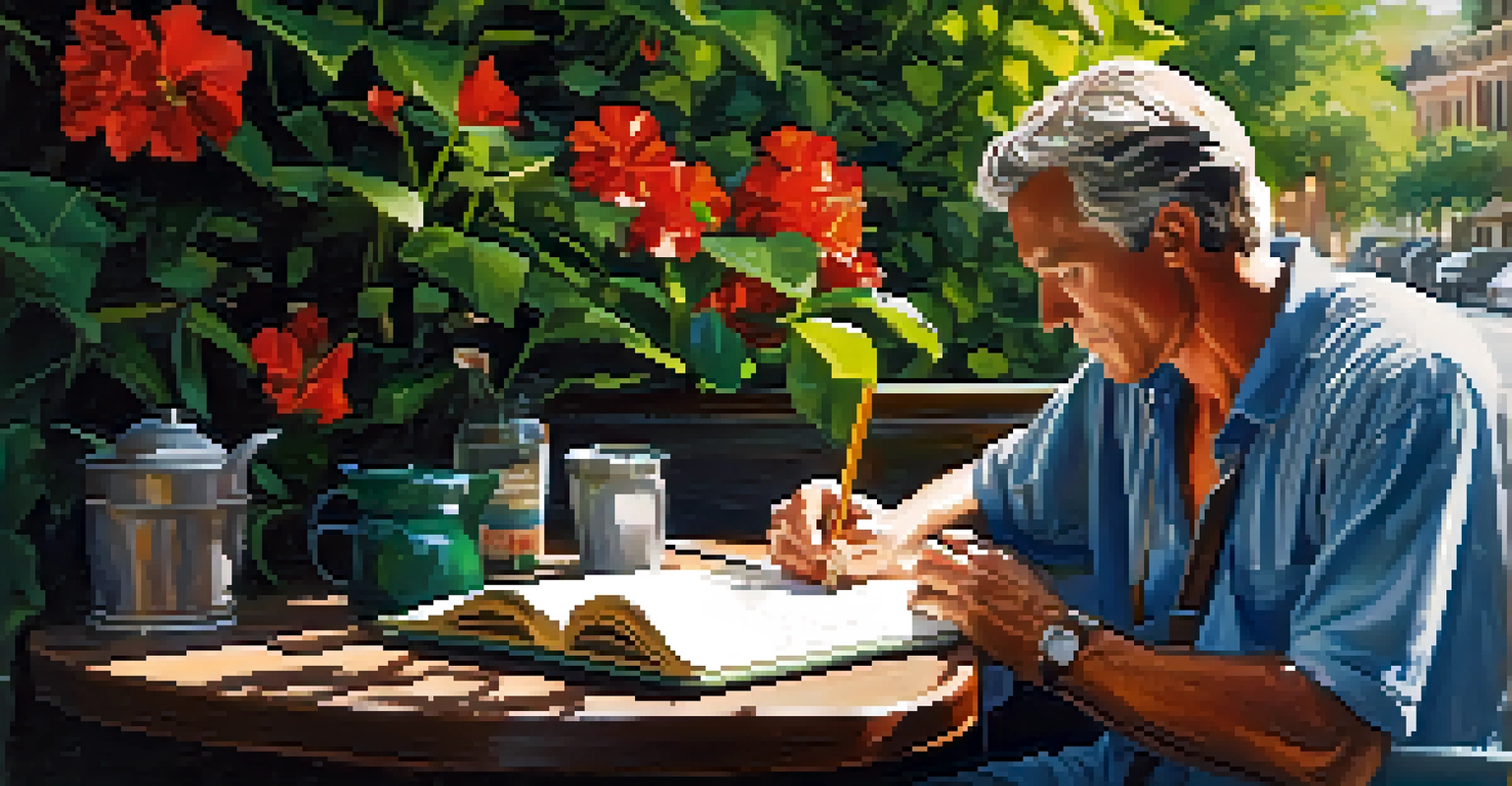Poetic Inspirations: New Orleans in the Works of Authors

The Soul of New Orleans: A Poetic Tapestry
New Orleans, often referred to as the 'Big Easy,' is a city that pulsates with life, culture, and history. Its rich tapestry of influences from French, African, and Spanish roots makes it an unparalleled source of inspiration for poets. The vibrant streets, jazz music, and annual festivities create a unique atmosphere that resonates deeply within the literary community.
Jazz is the big band of my life, and I am the soloist.
Authors like Walt Whitman and Langston Hughes have found themselves captivated by the city's charm. Their works often reflect the rhythm of New Orleans, blending personal experiences with broader cultural narratives. This synergy between place and verse showcases how environment can shape artistic expression.
In essence, New Orleans is more than just a backdrop; it's a character in its own right—one that breathes life into the words of those who write about it. The city's spirit, with its warmth and complexity, invites poets to explore themes of love, loss, and resilience.
Influence of Jazz: The Soundtrack of Poetry
Jazz music, a genre born in New Orleans, plays a pivotal role in the city's literary scene. Many poets draw parallels between the improvisational nature of jazz and their own creative processes. The spontaneity and emotional depth found in jazz melodies often mirror the themes explored in poetry, creating a harmonious relationship between the two art forms.

For instance, poet and musician A. Van Jordan illustrates how jazz influences his writing style. He often incorporates elements of rhythm and improvisation, which allows his verses to flow in a way that feels alive and dynamic. This connection highlights the importance of music in shaping not just the content but also the form of poetic works.
New Orleans: A Poet's Playground
The city's rich cultural tapestry and vibrant atmosphere inspire poets to explore themes of love, loss, and resilience.
Ultimately, the sounds of New Orleans serve as a muse for many poets. Whether it's the strumming of a guitar or the soulful notes of a saxophone, these musical elements enrich the poetic landscape, making it a vibrant and evolving medium.
Historical Echoes: The City’s Past in Verse
The history of New Orleans is steeped in stories of struggle, triumph, and resilience, all of which find their way into poetry. From the impact of Hurricane Katrina to the legacies of slavery and civil rights, authors carefully weave these narratives into their works. This historical context adds depth and urgency to their poetry, revealing the city’s complex identity.
Poetry is the echo of the past, reverberating in the present.
Poets like Rita Dove and Natasha Trethewey tackle these themes head-on, using their verses to explore the interplay between personal and collective histories. Their poems often serve as a reflection on the past, inviting readers to grapple with the realities of the present. This poignant re-examination of history encourages a deeper understanding of both the city and its people.
Thus, the echoes of New Orleans' past resonate through the lines of its poets, creating a powerful dialogue between history and contemporary life. It's a reminder that poetry can serve as both a record and a reflection of the times we live in.
Cultural Melting Pot: Diversity in Poetry
New Orleans thrives on its diversity, which is vividly reflected in its poetry. The city is a melting pot of cultures, traditions, and languages, making it a fertile ground for varied poetic expressions. Poets from different backgrounds contribute their unique voices, enriching the literary landscape with fresh perspectives.
Take, for example, the work of poet Kaveh Akbar, who often explores themes of identity and belonging through a lens shaped by his Iranian heritage. His experiences in New Orleans allow him to juxtapose different cultural narratives, creating poetry that resonates with a broad audience. This blending of influences underscores the beauty of diversity in art.
Jazz as a Poetic Muse
The improvisational nature of jazz significantly influences poets, mirroring their creative processes and enhancing the emotional depth of their work.
In this way, the multicultural essence of New Orleans not only inspires individual poets but also fosters a sense of community among them. The connections formed through shared experiences and cultural exchange ultimately elevate the poetry scene, making it a vibrant and inclusive space.
The Use of Local Dialect in Poetry
The unique dialect of New Orleans, often infused with Creole and Cajun influences, adds a rich layer to its poetry. Authors embrace local vernacular, using it as a tool to convey authenticity and evoke the city's spirit. This linguistic flavor brings poems to life, making them resonate with both locals and visitors alike.
For instance, poet and playwright John Biguenet employs the local dialect in his work to capture the essence of New Orleans conversations. His use of language not only reflects the city’s identity but also serves to connect readers with its culture. This authentic representation fosters a deeper appreciation for the richness of the city’s linguistic heritage.
Consequently, the incorporation of local dialect in poetry not only enhances the reading experience but also preserves the cultural nuances of New Orleans. It serves as a reminder of the importance of language in shaping artistic expression and cultural identity.
Nature's Influence: The Bayou and Beyond
The natural beauty of New Orleans, from the serene bayous to the vibrant gardens, inspires poets in profound ways. Nature serves as a backdrop for many literary works, illustrating the interconnectedness of environment and emotion. The lush landscapes often symbolize themes of growth, change, and reflection, inviting readers to explore deeper meanings.
For example, poet and essayist Jericho Brown draws on the natural world to explore personal narratives and broader societal issues. His vivid imagery transports readers to the bayous and swamps, allowing them to feel the weight of the landscape. This connection between nature and storytelling enriches the reader's experience and invites introspection.
Diversity Enriches Literary Voices
The multicultural essence of New Orleans fosters varied poetic expressions, creating a vibrant literary community that embraces diverse narratives.
Ultimately, the natural surroundings of New Orleans are more than just scenery; they act as a catalyst for creativity. The beauty of the bayou and the city's gardens serves as a reminder of the power of nature to inspire and transform.
Festivals and Celebrations: Poetry in Motion
New Orleans is renowned for its lively festivals, and these celebrations often inspire poetic works that capture the essence of the city. Events like Mardi Gras and Jazz Fest create a vibrant atmosphere that poets harness to express joy, community, and culture. The energy of these gatherings translates into dynamic verses that resonate with readers.
Poets often use the imagery of parades, music, and dance to convey the excitement and exuberance of these events. The communal spirit found during festivals fosters a sense of connection, allowing poets to explore themes of unity and celebration. This shared experience enriches the poetry, making it relatable to both locals and those far away.

In this way, the festivals of New Orleans not only serve as inspiration but also as a reminder of the city's resilience and spirit. The collective joy experienced during these celebrations finds its way into poetry, highlighting the importance of community and cultural identity.